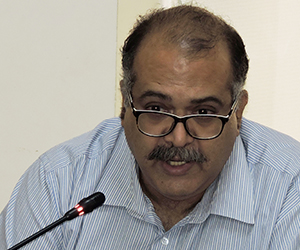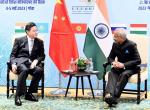Apart from all the other seminal outcomes of the visit of the US President Barack Obama to New Delhi, the complete absence of any reference to Pakistan is quite remarkable. Although Pakistan was never really mentioned by name in any of the previous declarations and joint statements between India and US, it was always an issue that rankled with India and invariably became a cause for grouse with the Americans. But now both countries seem to have transcended this issue in taking their bilateral relationship to a new level. In other words, Pakistan is no longer an obstacle in the path of India’s relationship with the US. At best, it is an irritant that both sides are willing to ignore in forging more fruitful and beneficial ties.
More than a decade ago, the Americans had de-hyphenated India and Pakistan. They had figured out that India was in a completely different league from Pakistan. The problem was that while India had always wanted this de-hyphenation, it seemed psychologically unable and strategically unwilling to end the hyphenation with Pakistan. Every time the Indians and Americans engaged each other, it wasn’t so much the Americans who wanted to discuss Pakistan with India as it was India which wanted to complain about and discuss Pakistan with the Americans. As a result, India was just not able to go beyond the South Asian strategic context and inevitably dragged itself back into the rut of Indo-Pak dynamic. It had almost become a reflex for India to see all its bilateral ties from the prism of Pakistan. In doing so, India ended up putting itself on the same plane as Pakistan and thus diminished itself. But all that seems to have changed during this summit meeting between Prime Minister Narendra Modi and US President Obama. By shaking off its obsession with Pakistan, India is now stepping up to the plate to play a bigger role in not just the regional strategic sphere, but also on many issues of global concern, including terrorism and climate change.
All this is not to say that India has no longer any problem or concerns regarding Pakistan. Far from it, Pakistan continues to remain a headache for us just as it remains an ‘international migraine’ for rest of the world. India continues to face the threat of terrorism from Pakistan and the instability in the region that is being spawned by Pakistani policies and strategic calculus. But India is no longer going to let Pakistan bog it down. It is perhaps reflective of the self-confidence of India that it has recognised that on Pakistan there is both a convergence, as well as a divergence, between India and the US. Both countries see Pakistan as a problem – there is a convergence of views on this – but both disagree on how to manage, let along solve, this problem – this is where there is a divergence of views. India believes that mollycoddling Pakistan or giving in to its blackmail or buying into its claims of altering its rank bad behaviour and its patronage of jihadist terrorist groups is not going to work. According to India, the American policy of throwing money at Pakistan in the fond hope that it will change or at the very least keep the US engaged with Pakistan, is a failed policy. Far from changing Pakistan, this policy encourages and incentivises Pakistan to continue with its perfidious policies, the impact of which is felt by India.
Until now, this divergence was a stumbling block between India and the US, but no more. Both countries have moved on to bigger things and a more productive and positive partnership. This has caused enormous heartburn in Pakistan, not just in the media and the political class but also in the military establishment. In order to show to both India and US that Pakistan has options, the Army Chief scheduled a visit to China to coincide with Obama’s visit to India. This suited China which too has been watching with some consternation the growing closeness between India and the US. But China is clearly trying to make the best of a bad bargain. After all, while the US gets a mutually beneficial partnership with India in both strategic and economic fields, China has to make do with Pakistan which has nothing positive to offer to China and is at best a parasitical client which is also a bottom less pit where Chinese investments will be sunk without any return.
Be that as it may, inside Pakistan there are broadly three sorts of reactions to the Obama visit: the first is by some sober and sensible people who have done self-introspection and acknowledged that Pakistan has been left behind by an India which has entered a new league. They accept that Pakistan's policies of nurturing terrorism has brought the country to a point where its sole value to the rest of the world is its nuisance value. The only reason why the world engages Pakistan is to keep the negativity emanating from Pakistan – from the spread of polio to export of terrorism – under check; the second reaction is the lament over having been ‘betrayed’ by the US. In this, the services and sacrifices rendered by Pakistan for the US in the War on Terror are highlighted but, very conveniently, the Pakistanis don’t mention the money they charged for rendering these services or, for that matter, their perfidy and treachery in giving safe havens to jihadist terrorists who were responsible for the deaths of thousands of US soldiers in Afghanistan. What is even worse, the Pakistanis have been disabused of their fanciful notions that Obama will lean on the Indian side to reopen a dialogue with Pakistan. Adding insult to injury, there was absolutely no mention of the K-word (Kashmir) anywhere during the visit. To be sure, the two leaders must have discussed Pakistan since they have common concerns about that country. But if Pakistan was hoping that the Americans would pressure India to go easy on Pakistani transgressions along the International Border and LoC or would seek some concessions for Pakistan, that doesn’t seem to have happened.
The third reaction is to bring the China factor into play and also draw some comfort from the fact that the Russians are reaching out to Pakistan. As far as the Russians are concerned, their approach to Pakistan is aimed more at India than at Pakistan. The Russians know that there is no way that Pakistan can replace India as a market for Russian weapons because Pakistan neither has the money to pay nor the size to absorb Russian weapons. Clearly, the Russian calculation is that if they are seen as getting close to Pakistan, India will be forced to step back a little from America’s embrace. But just as Russia is playing games with India using Pakistan, India too has signalled that if Russia doesn’t play fair in the weapons trade, then India will diversify its weapons procurement. Something similar is going to happen with China which has used Pakistan to create a counter weight to India. Now India is using the US to counter-balance China. If the Chinese don’t want this, they will have to address India’s concerns and desist from following the aggressive policies of the past.
The Pakistanis would also be bristling at the US desire to see India play a greater role in Afghanistan. Unfortunately, there isn’t much that India can do at this late stage in Afghanistan, even less so in light of the fact that the new Afghan President has thrown in his lot with Pakistan. Nevertheless, both the US and India have a common interest in seeing Afghanistan stabilise. At the very least, it is not in the interest of both countries to see Afghanistan descend into chaos and have the forces of fanaticism as represented by the Taliban take over that country. There may not be a lot that the two countries can do together in Afghanistan at this point in time other than engage each other in close intelligence and security cooperation and coordination. Given that the wheel keeps turning in Afghanistan, it won’t be long before Pakistan is once again on the out and India on the in inside Afghanistan. At that stage, close US-India ties being forged today will come in handy. By all accounts then, the Obama visit has come as a shot in the arm for India and by ignoring Pakistan, India has managed to make a breakthrough that will help it immensely when in the future it decides to do something to sort out its Pakistan problem.
Published Date: 28th January 2015, Image source: http://4.bp.blogspot.com
(Disclaimer: The views and opinions expressed in this article are those of the author and do not necessarily reflect the official policy or position of the Vivekananda International Foundation)










Post new comment